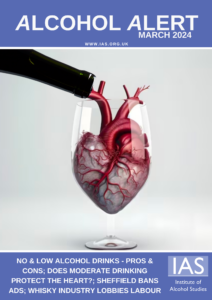In this month’s alert
The pros and cons of no and low alcohol drinks
In this month’s podcast we spoke to John Holmes, Professor of Alcohol Policy at the University of Sheffield, about no and low alcohol products. We discussed the project the Sheffield Alcohol Research Group is running on the topic, why these products are gaining attention, who consumes them, the concerns among public health groups, and what the market for such products will look like in the coming years.
IAS’s Small Grants Scheme now open for applications
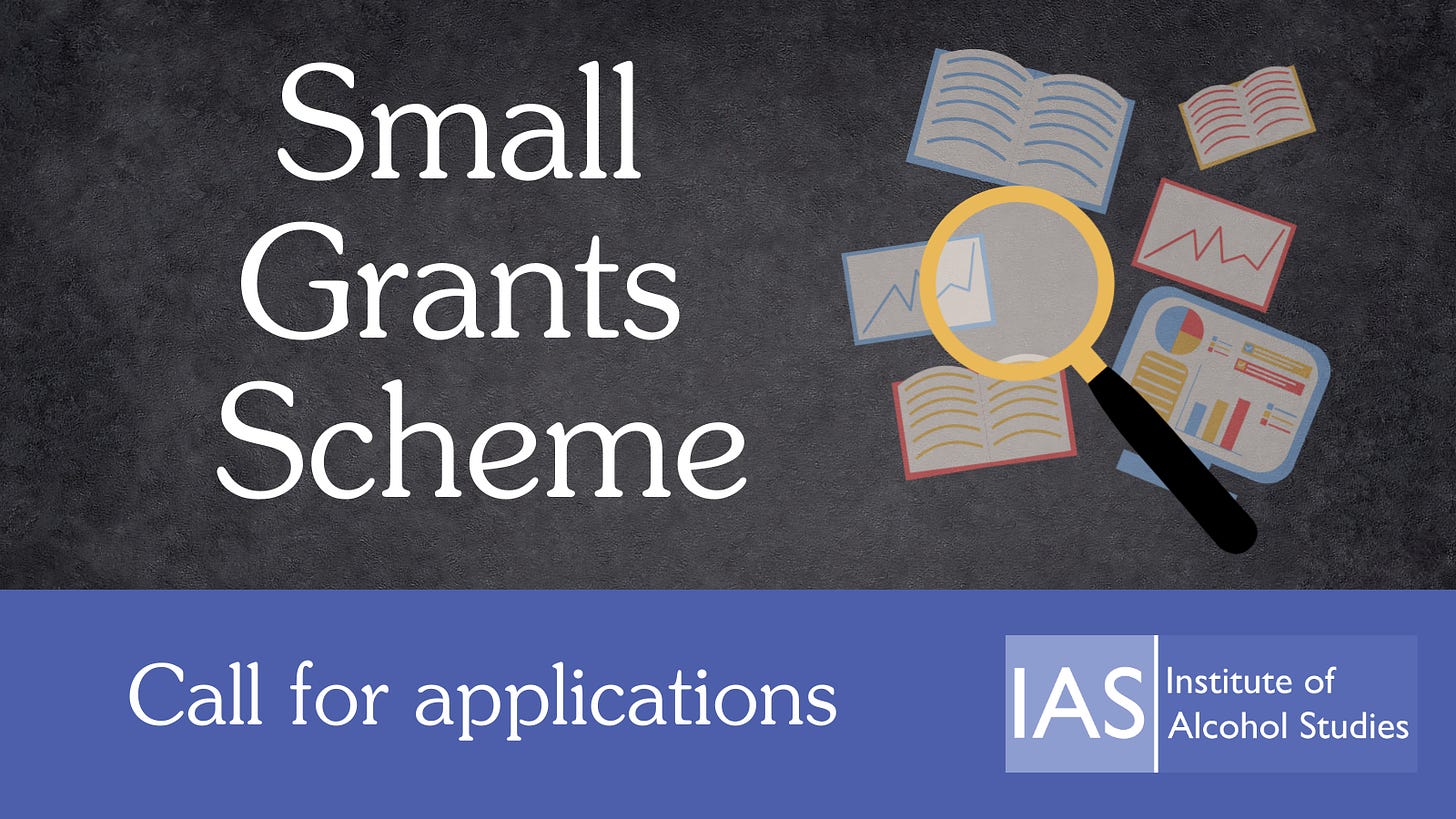
We are inviting applications from researchers – especially early career researchers – to our Small Grants Scheme. This scheme will fund innovative research ideas that can help inform public policy debates on how to tackle alcohol harm.
Priority will be given to proposals that align with our challenge for 2023-2026: Addressing alcohol-related inequalities.
Awards will be between £500 – £10,000 with a duration of 12 months.
Please see our webpage for further information, including how to apply.
Does moderate drinking protect the heart?
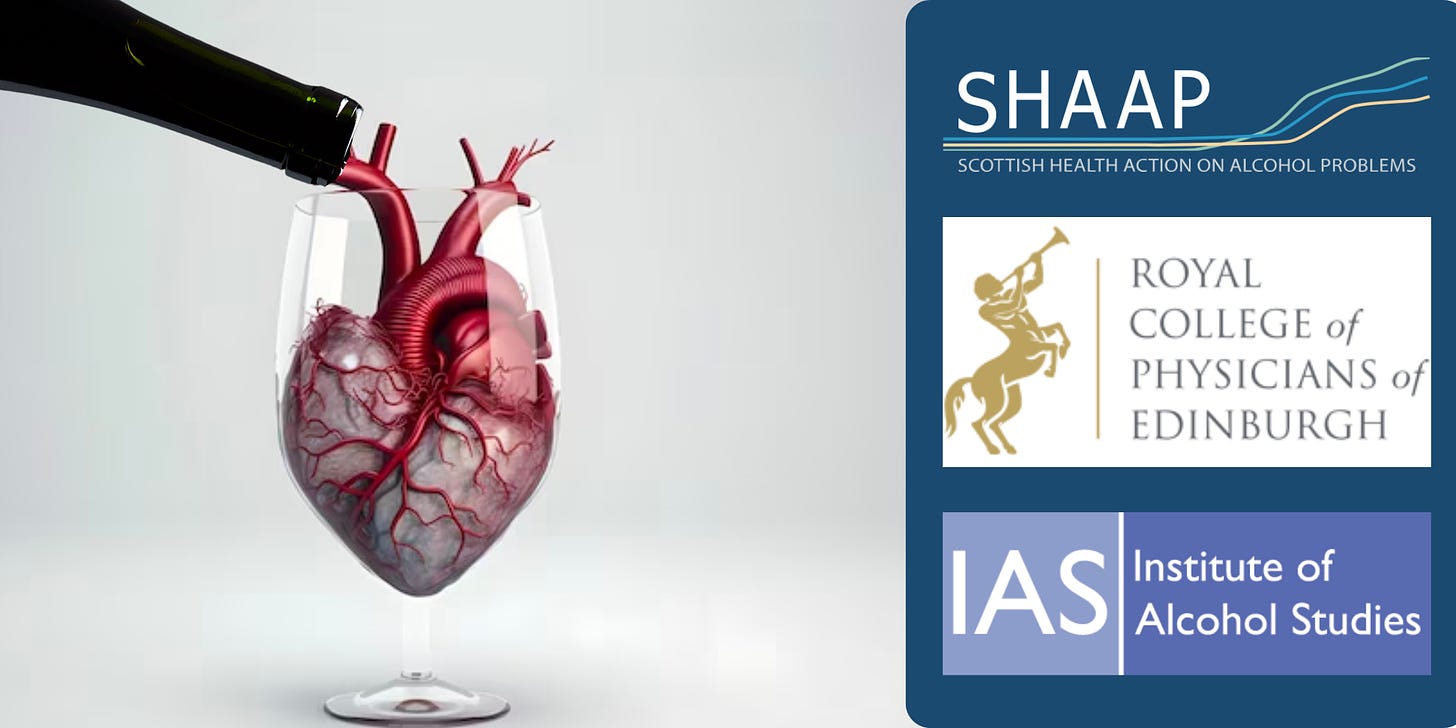
On 17 April we will be co-hosting a public lecture by Professor Tim Stockwell on the latest evidence of alcohol’s effects on the cardiovascular system – with RCP Edinburgh and Scottish Health Action on Alcohol Problems (SHAAP).
The public lecture will be held from 18:00-19:00 at the Royal College of Physicians, Edinburgh. You can either attend in person or online – register here.
Pubs that offer non-alcoholic beer on draught reduce alcohol consumption
A study carried out by Bristol City Council and the Tobacco and Alcohol Research Group at the University of Bristol has found that making alcohol-free beer more available on draught in pubs and bars may help people switch from alcoholic beer.
14 pubs and bars across Bristol temporarily changed the drinks they offered. When an alcohol-free option was available, venues sold 51 fewer alcoholic pints of beer each week on average – a reduction of 4-5%.
Crucially, this was replaced by an equal increase in sales of non-alcoholic options, leading to no money lost by the pubs.
One of the authors of the study, Dr Angela Atwood, explained that:
“This does not restrict consumer choice; in fact, it increases the options available to the customer, and at the same time could reduce population levels of alcohol consumption and improve public health.”
No and low alcohol products have the potential to contribute to improving public health, although there are concerns among the public health community that this could distract governments from implementing more evidence-based policies. These issues are discussed in this month’s podcast.
Alcohol duty freeze extended for 6 months from August 2024
In the Spring Budget on 06 March, the Chancellor of the Exchequer, Jeremy Hunt, extended the freeze on alcohol duty rates. A freeze was already in place from 01 February to 01 August 2024, so this second freeze extends that to 01 February 2025.
Dr Katherine Severi, IAS’s Chief Executive, criticised the decision:
“Alcohol duty freezes over the past decade have led to alcohol becoming much more affordable, with it now being at its most affordable level since before Rishi Sunak was born. This is a political choice that has directly led to increases in alcohol consumption and subsequent deaths.
“It also damages the UK economy because alcohol is the biggest risk factor for ill health and death among working age people. If the government was serious about long-term economic stability, it simply would not make such a short-term, headline-grabbing decision.
“Let’s be clear, this is a tax break for the multinational alcohol industry, meaning the government has chosen big business over the taxpayer. Money will need to be found elsewhere, either through cuts to vital public services or tax increases. It also harms pubs, as freezing duty allows supermarkets to maintain much lower prices on alcohol compared to pubs, encouraging people to drink more at home.”
Hunt said that the decision was “to benefit 38,000 pubs” and to “back the great British pub”. As IAS has frequently mentioned, freezing alcohol duty rates across the board does not help pubs, as it allows supermarkets to maintain much lower prices on alcohol, driving people to consuming at home more. The only time in the past 15 years when the gap in affordability of on- and off-trade alcohol was closing was when duty was being increased each year by inflation +2% (see our latest report for more on this topic).
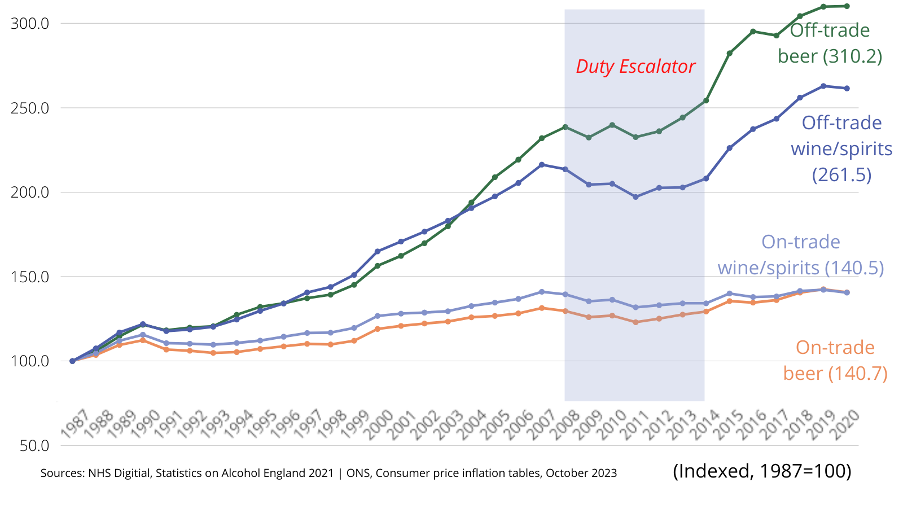
Although many MPs and industry representatives commended the duty freeze, there were a number of criticisms from the alcohol industry. The Campaign for Pubs, a grassroots organisation that aims to protect pubs, said:
The campaign group also wrote that: “If you are serious [about protecting pubs] listen to #publicans, NOT the BBPA who represent global brewers & investment fund owned/offshore pubcos.” They also hit out at the Long Live the Local campaign, stating that: “The so called ‘long live the local’ campaign, which is really the campaign of the big brewers & pubcos to make millions for themselves through #beerduty cuts, has been a disaster for #pubs & #publicans who need DIRECT meaningful support.”
Wine lobby continues call for permanent easement
Alongside their repeated calls to freeze alcohol duty rates, the Wine and Spirit Trade Association has also been calling for the wine duty easement to be made permanent.
The easement – which was brought in as part of the new alcohol duty system – was introduced to give wine producers time to adjust to the new rates. It means that all wine between ABV strength 11.5-14.5% will have duty applied as if it were 12.5% ABV.
However, as Exchequer Secretary Gareth Davies has stated, making the easement permanent would negate the public health aspect of the reform.
One of the aims of the new system is to encourage the production of less strong and harmful products by giving a commercial incentive to reduce and reformulate products. Some beer producers have already started to do this. Wine producers are unlikely to do so until the easement comes to an end in February 2025.
To help understand the implications of the easement, currently a bottle of wine of 11.5% ABV will pay £2.67 in duty, the same as a 14.5% bottle. When the easement ends, the 11.5% bottle will pay £2.46 and the 14.5% bottle will pay £3.10.
Sheffield City Council bans unhealthy commodity advertising
Sheffield has become one of the first UK cities to ban advertising for alcohol, unhealthy food, and polluting industries. The ban will cover all local authority-owned outdoor advertising space, online media, and sponsorship opportunities.
The ban also covers low or zero alcohol drinks from alcoholic brands. This is important as alcohol companies have reacted to other bans – such as in Ireland – by advertising their non-alcoholic products, which has been seen as a way of circumventing restrictions and continuing to advertise their brand/all products.
Sheffield’s ban also covers short-term loans, fossil fuel products, some breast or infant milk formulas, petrol, diesel and hybrid plug-in vehicles, gambling and betting products, and airlines and airports.
Greg Fell, Sheffield’s Director of Public Health, said that when Transport for London banned junk food ads, the loss of income predicted by some never actually happened.
Scotland’s debate on minimum unit pricing and advertising bans continues
Despite the Scottish Government being set on continuing minimum unit pricing (MUP) and uprating it to 65p, there continues to be significant debate regarding whether either of these measures should apply.
On 26 March, the Scottish Parliament’s Health, Social Care and Sport Committee met to debate the policy. Carol Mochan MSP stated that Scottish Labour supported the policy and the uprating, although she said that industry profits from MUP should be used to fund public health services. She also said treatment funding should be increased.
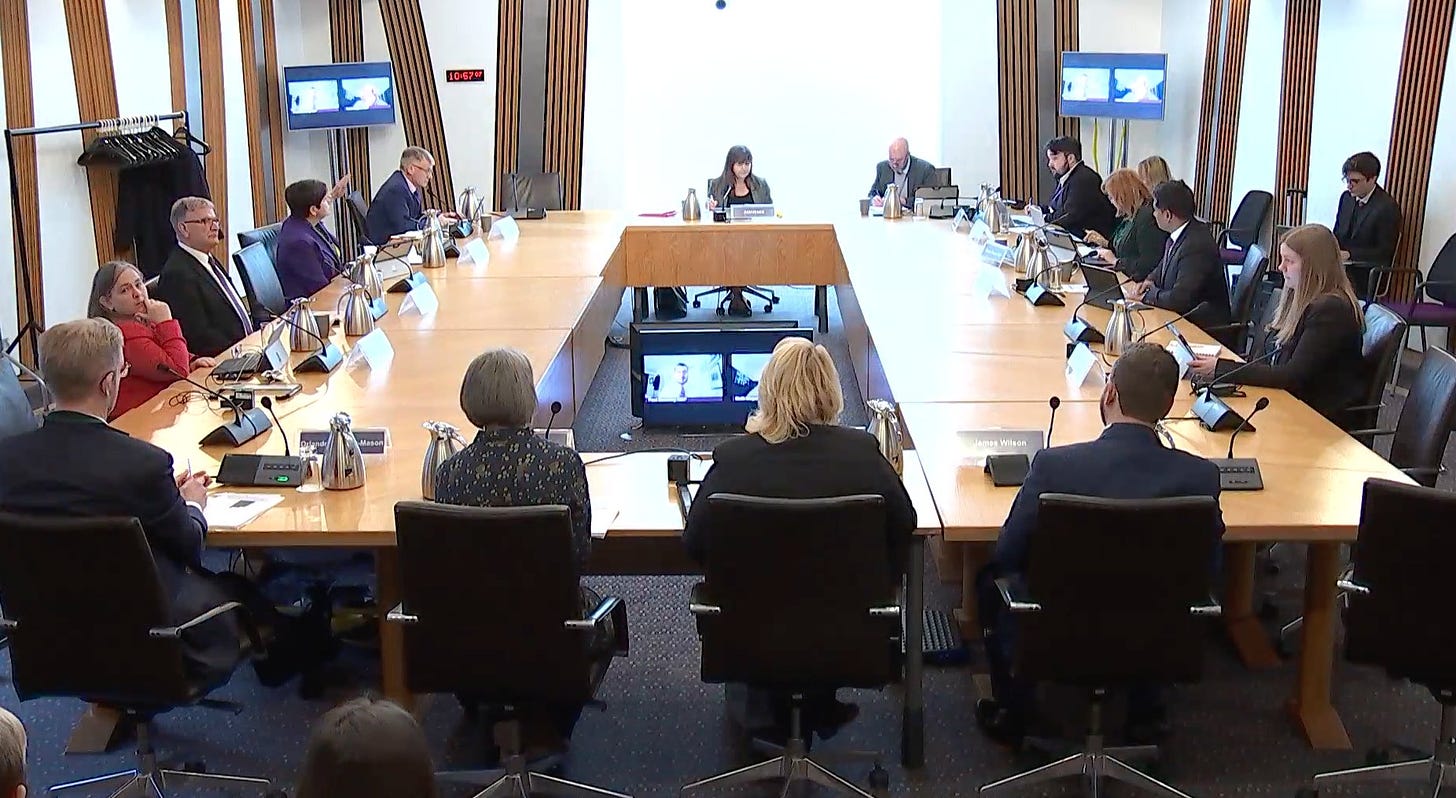
Scottish Conservative MSPs Sandesh Gulhane and Tess White both voted against the policy, despite Gulhane stating that retailers were making “outrageous” profits which should be used to fund treatment. Christina McKelvie, Minister for Drugs and Alcohol Policy, said that she was glad to hear he supported a levy on retailers.
The Committee voted in favour of continuing and uprating the policy, so will now report back to parliament with its advice and recommendations on Friday 29 March, ahead of a final vote in late April.
In the run up to the Committee meeting and April’s vote, more than 80 charities, medical organisations, and faith groups came together in mid-March to urge MSPs to vote through the 65p rate. Alison Douglas, Chief Executive of Alcohol Focus Scotland, said:
“Minimum pricing has resulted in tangible benefits to Scotland’s health and wellbeing. Hundreds of lives have been saved, it has helped reduce the burden on our NHS through significantly reducing hospital admissions at a time of major strain for the health service – and has resulted in a reduction in health inequalities affecting some of our most vulnerable communities.”
Lorraine Gillies, CEO of the Scottish Community Safety Network, said MUP could also play a role in reducing alcohol-related crime, violence and antisocial behaviour:
“In 2021/22, 37% of offenders were thought to have been under the influence of alcohol by victims of violent crime and 43% of the accused in homicides in Scotland in the ten years between 2010-2020 were under the influence of alcohol at the time of their offence.
“Anything that reduces harmful or hazardous drinking is likely not only to reduce health harms but also these wider social harms.”
In recent weeks however, the GMB – a trade union with 560,000 members – has criticised the Government’s plans. David Hume, the GMB Scotland union organiser for the drinks industry, has been very vocal in the media, arguing that MUP is an “untested tax” that will “punish the poorest Scots”. Hume also compared the proposed 30% rise in the rate of MUP to the spending power of Scots, which has risen by 1% when adjusted for inflation.
Health economist Colin Angus pointed out the misleading nature of comparing nominal MUP rates with inflation-adjusted spending power:
In the Herald towards the end of March, Dr Alastair MacGilchrist also hit back at the Hume’s claims:
“[Hume] calls for collection and scrutiny of reliable data – which is exactly what has happened. MUP has been subject to greater scrutiny than any previous Holyrood legislation, and the evidence is entirely clear: it is saving lives without significant unintended consequences.
“Mr Hume calls for particular attention to be paid to the impact of MUP on Scotland’s poorest postcodes. He can rest assured that the benefits of MUP are indeed most strongly seen in the poorest communities, with most of the lives saved and hospital admissions avoided being in the 40% most deprived areas.”
Public Health Scotland has submitted a letter to the Health Committee, answering a number of criticisms aimed at the policy, including what it means by the 4.1% reduction in hospital admissions not being statistically significant, why the evaluation has to assess a counterfactual, and the impact of MUP on family budgets and different types of drinkers.
‘Targeted engagement’ in alcohol advertising ban
Talks are due to start in the coming weeks between businesses, public health groups, and the Scottish Government to discuss alcohol advertising restrictions.
The Scottish Government consulted on a ban of alcohol advertising last year but put next steps on the back-burner after Humza Yousaf become First Minister.
Partly in order to placate the industry, there will be ‘targeted engagement’ with these groups. A spokesperson said Mr Yousaf is “keen to take a fresh look at balancing those aims with careful consideration of the impact restrictions may have on business. We’re undertaking targeted engagement and aim to consult on a narrower set of proposals later this year”.
In related news
The Herald newspaper in Scotland ran a comprehensive series about alcohol, which you can find here: https://www.heraldscotland.com/news/24159186.scotland-alcohol-find-full-list-articles/.
The articles include comment from many people across the public health community, and tackle issues such as:
- Scotland’s changing relationship with alcohol
- A short history of Scotland’s changing drinking culture
- Why do some countries have cheap alcohol yet long life expectancies?
- Alcohol addiction, the 12 step programme and breaking the cycle
- Alcohol and football: Experts make case for sponsorship ban
Scotch whisky industry prepares for a Labour government
The alcohol giant Diageo held a dinner and whisky tasting in November “for Labour MPs to showcase the importance of Scotch whisky”, according to the most recent register of interests in the Commons.
Labour MPs Gerald Jones (Shadow Minister for Scotland), Ian Murray (Shadow Secretary of State for Scotland), and Charlotte Nichols (MP for Warrington North) attended Diageo HQ in Soho for the dinner and tasting which was worth £320 a person.
A few days before, according to the Scottish Lobbying register, the Scotch Whisky Association held a roundtable with Labour MSPs, including Dame Jackie Baillie (Deputy Leader of the Scottish Labour Party) and Anas Sarwar (MSP for Glasgow Central). There they wanted to stress: “the importance of Scotland being a competitive business environment where businesses can grow and develop commercial opportunities so the industry can be confident in revitalising investments that had been hampered by the pandemic and subsequent economic challenges.”
Keir Starmer has previously tweeted that: “it’s clear Scotland’s whisky industry isn’t getting the stability it needs from the Tories and the SNP. Labour will put growth at the heart of our government and back Scotch producers to the hilt.”
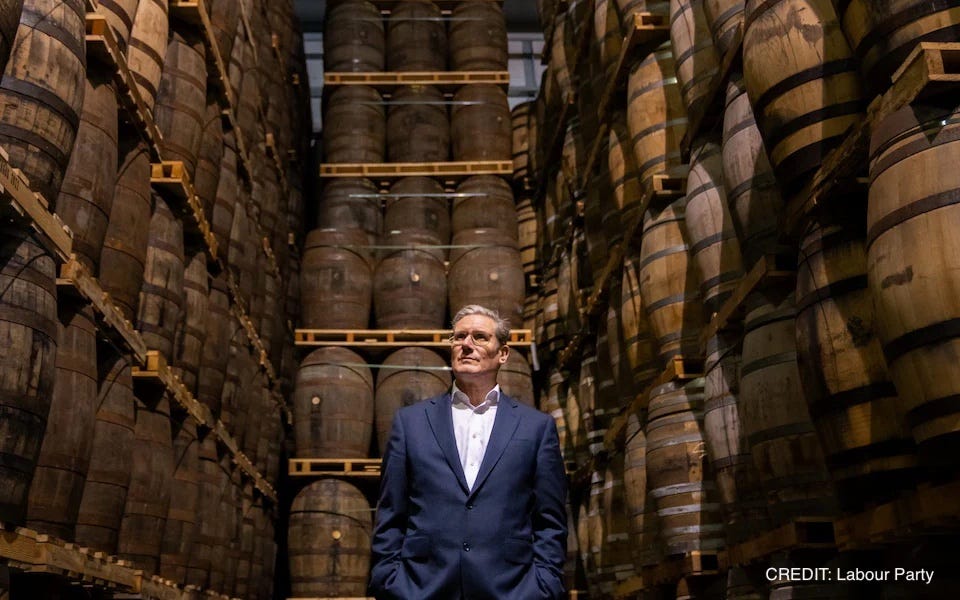
Strong opposition to liberalising Ireland’s licensing laws continues
Sixty five health, social and community groups have written to the Irish Government to criticise plans to extend opening hours for certain hospitality venues as part of the Sale of Alcohol Bill. They are calling for an immediate health impact assessment of the legislation.
International evidence indicates that a one-hour extension of alcohol trading hours is likely to lead to a 16% increase in alcohol-related crime, a 30% rise in traffic collisions in rural areas, and a 34% rise in alcohol-related injuries requiring hospital treatment.
Dr Catherine Conlon wrote in the Irish Examiner that:
“Added to this, proposals to increase the availability of alcohol through longer licensing hours and more venues for the sale of alcohol have the potential to negate all the really positive progress made by the Department of Health in recent years towards altering the culture around alcohol in Ireland.
“It is hard to fathom government strategy. Amid increased warnings about violence and lawlessness on city streets, and alarming increases in road deaths; the Government plans to increase opportunities for alcohol use.
“The Sale of Alcohol Bill is a mistake. It is an effort to appease the alcohol industry and wave the magic wand of further economic growth. A health impact assessment is needed and the industry should pay for the inevitable increased costs of societal and health harms.”
Read our blog by Dr Sheila Gilheany of Alcohol Action Ireland on what the Sale of Alcohol Bill means.
Alcohol Toolkit Study: update
The monthly data collected is from English households and began in March 2014. Each month involves a new representative sample of approximately 1,700 adults aged 16 and over.
See more data on the project website here.
Prevalence of increasing and higher risk drinking (AUDIT-C)
Increasing and higher risk drinking defined as those scoring >4 AUDIT-C. A-C1: Professional to clerical occupation C2-E: Manual occupation
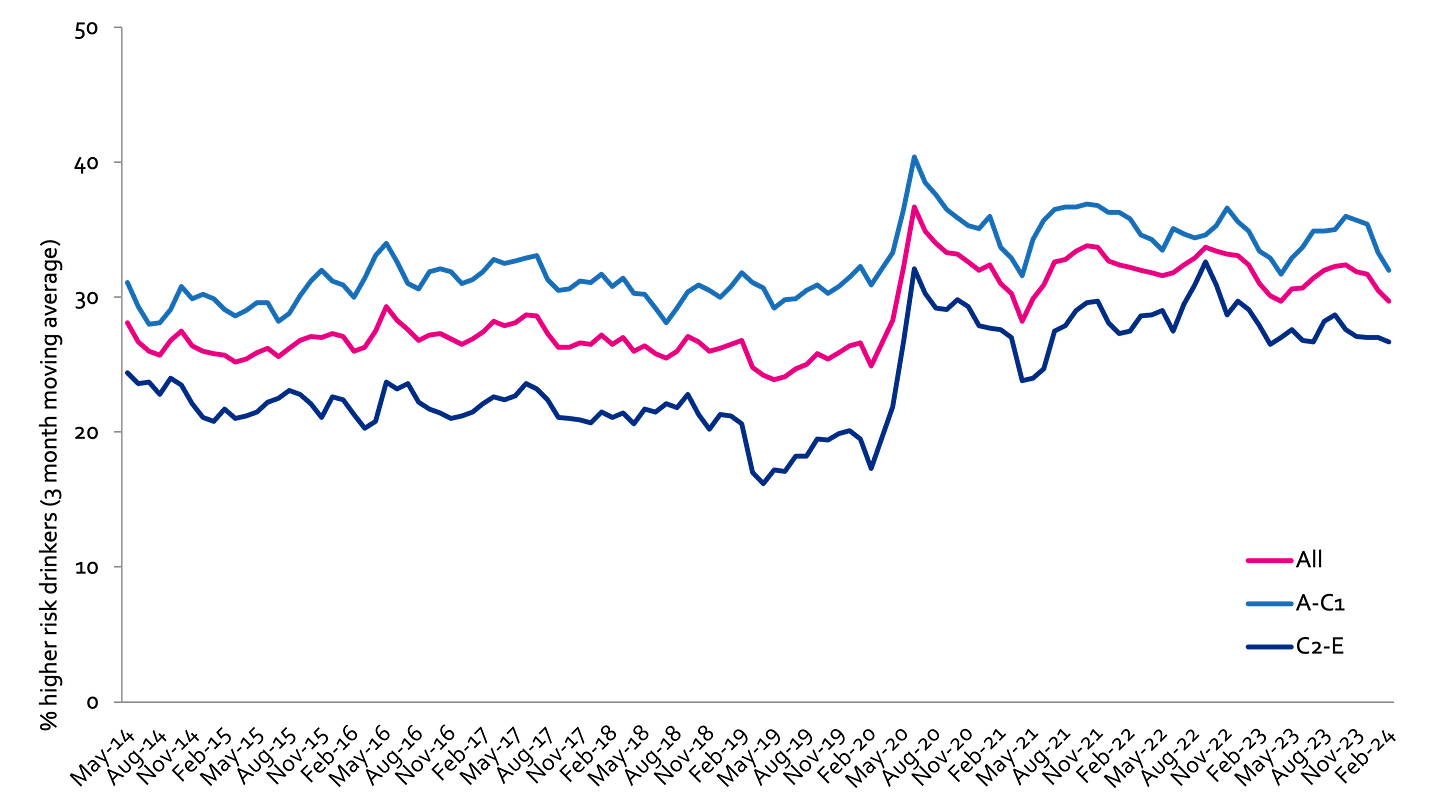
Currently trying to restrict consumption
A-C1: Professional to clerical occupation C2-E: Manual occupation; Question: Are you currently trying to restrict your alcohol consumption e.g. by drinking less, choosing lower strength alcohol or using smaller glasses? Are you currently trying to restrict your alcohol consumption e.g. by drinking less, choosing lower strength alcohol or using smaller glasses?
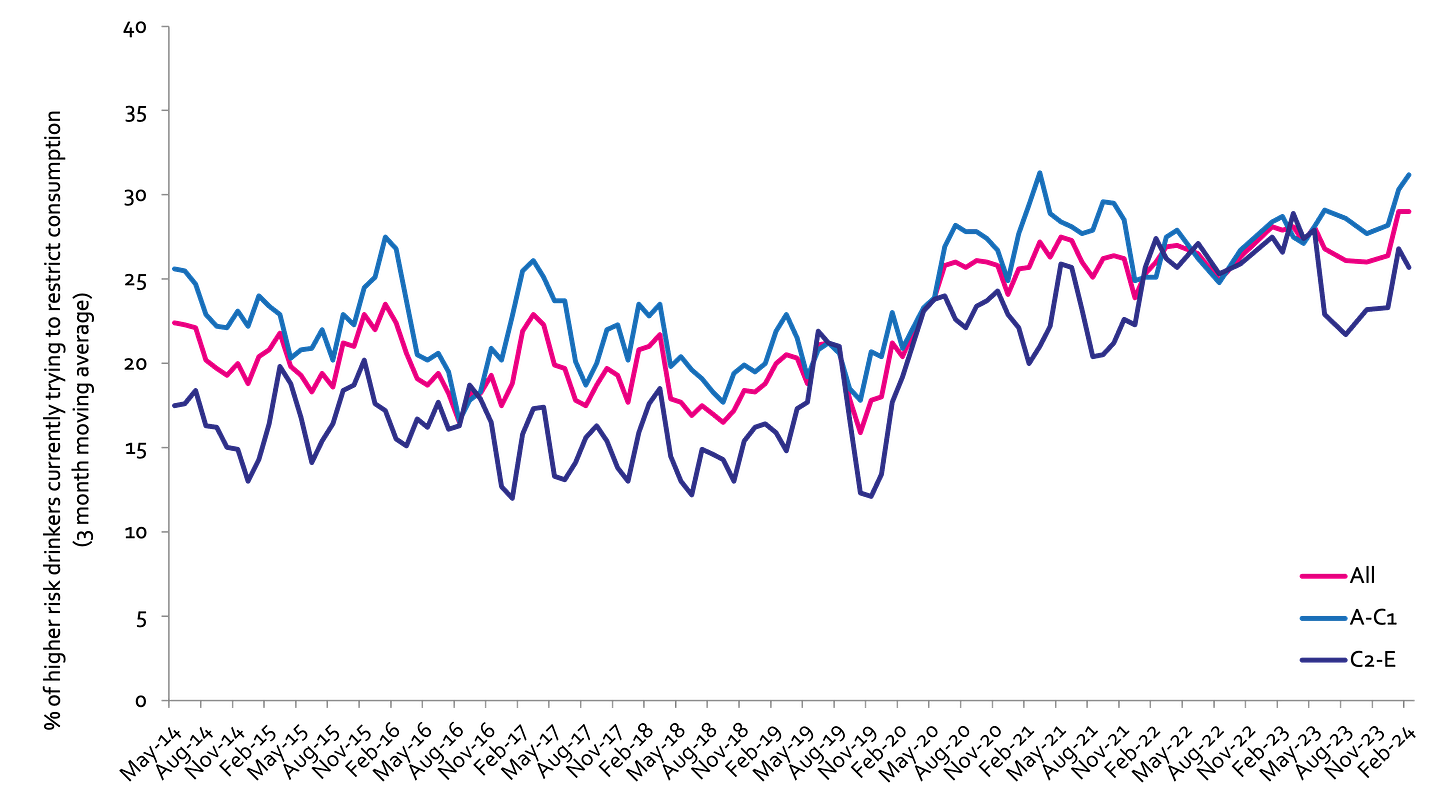
Serious past-year attempts to cut down or stop
Question 1: How many attempts to restrict your alcohol consumption have you made in the last 12 months (e.g. by drinking less, choosing lower strength alcohol or using smaller glasses)? Please include all attempts you have made in the last 12 months, whether or not they were successful, AND any attempt that you are currently making. Q2: During your most recent attempt to restrict your alcohol consumption, was it a serious attempt to cut down on your drinking permanently? A-C1: Professional to clerical occupation C2-E: Manual occupation
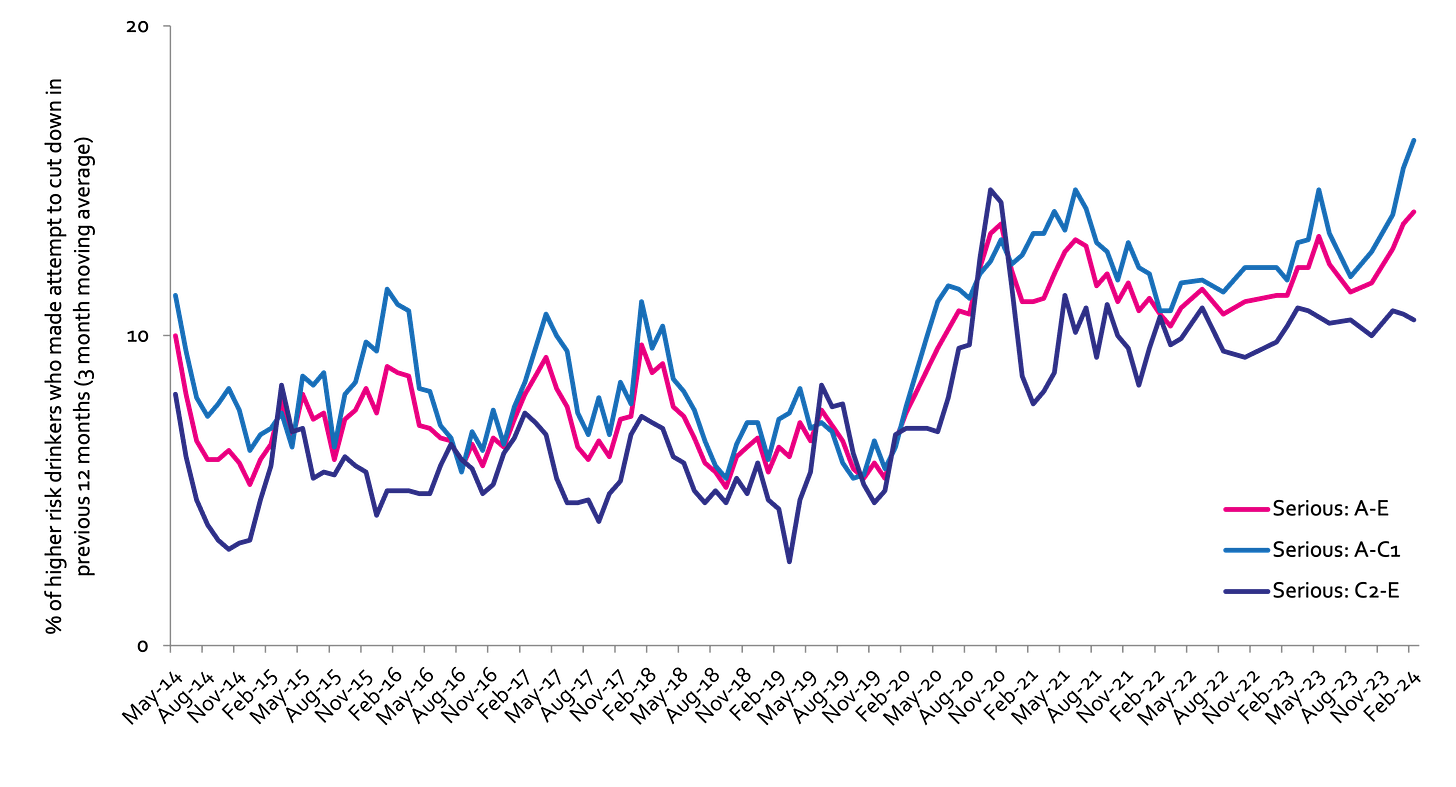
Podcast
Our monthly podcast features interviews with experts from across the sector.
Gambling industry harms and parallels with the alcohol world
Will Prochaska –
Coalition to End Gambling Ads

